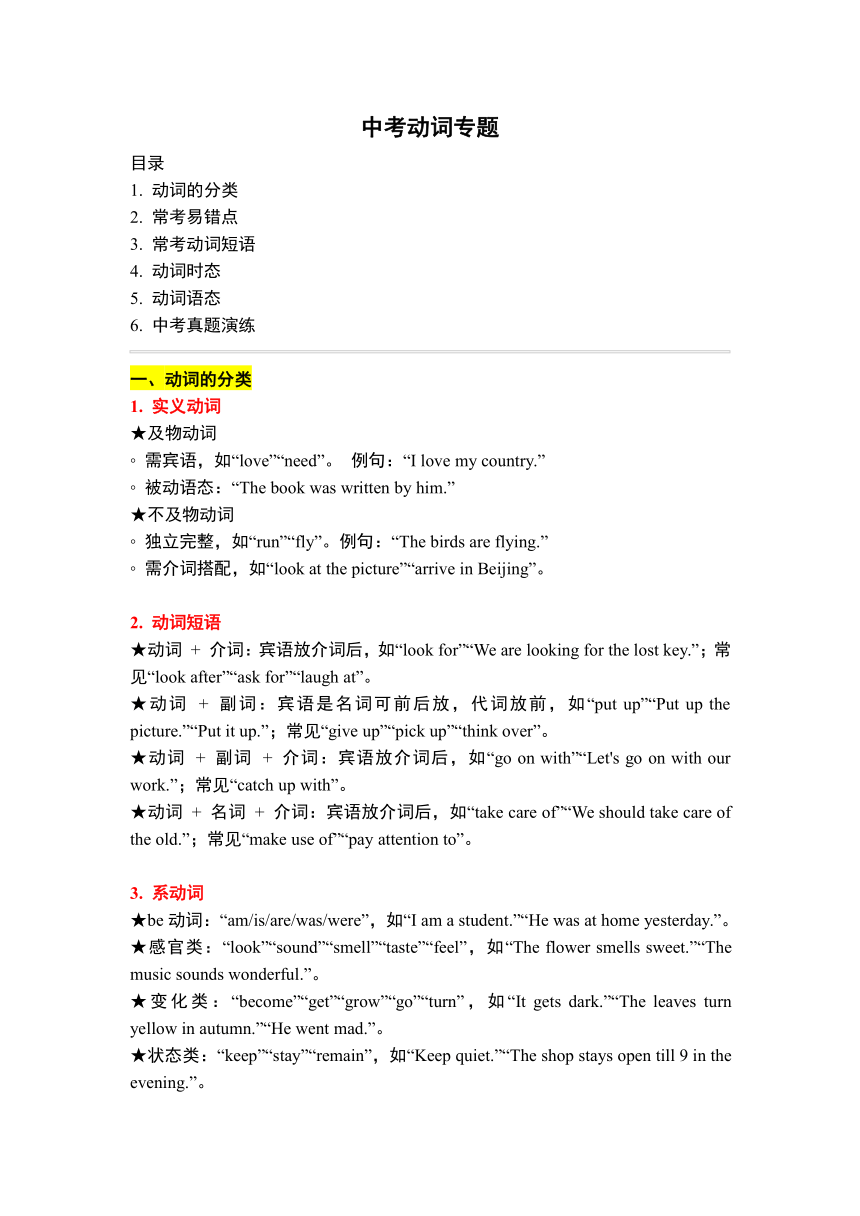
中考动词专题 目录 1. 动词的分类 2. 常考易错点 3. 常考动词短语 4. 动词时态 5. 动词语态 6. 中考真题演练 一、动词的分类 1. 实义动词 ★及物动词 需宾语,如“love”“need”。 例句:“I love my country.” 被动语态:“The book was written by him.” ★不及物动词 独立完整,如“run”“fly”。例句:“The birds are flying.” 需介词搭配,如“look at the picture”“arrive in Beijing”。 2. 动词短语 ★动词 + 介词:宾语放介词后,如“look for”“We are looking for the lost key.”;常见“look after”“ask for”“laugh at”。 ★动词 + 副词:宾语是名词可前后放,代词放前,如“put up”“Put up the picture.”“Put it up.”;常见“give up”“pick up”“think over”。 ★动词 + 副词 + 介词:宾语放介词后,如“go on with”“Let's go on with our work.”;常见“catch up with”。 ★动词 + 名词 + 介词:宾语放介词后,如“take care of”“We should take care of the old.”;常见“make use of”“pay attention to”。 3. 系动词 ★be动词:“am/is/are/was/were”,如“I am a student.”“He was at home yesterday.”。 ★感官类:“look”“sound”“smell”“taste”“feel”,如“The flower smells sweet.”“The music sounds wonderful.”。 ★变化类:“become”“get”“grow”“go”“turn”,如“It gets dark.”“The leaves turn yellow in autumn.”“He went mad.”。 ★状态类:“keep”“stay”“remain”,如“Keep quiet.”“The shop stays open till 9 in the evening.”。 ★ 系动词需与表语搭配,如“be”用于描述身份,“look”用于视觉感受,“become”用于变化过程,“keep”用于持续状态。 4. 助动词 ★助动词be的用法: “am/is/are + 动词 - ing”构成现在进行时,如“She is reading a book now.”。 “was/were + 动词 - ing”构成过去进行时,如“They were running at this time yesterday.”。 “be + 过去分词”构成被动语态,如“The letter was sent yesterday.”。 ★助动词do与have的用法: “do/does/did”用于疑问句和否定句,如“Do you like music ”“He doesn't like music.”;也可加强语气,如“I do like English.”。 “have/has + 过去分词”构成现在完成时,如“I have seen the film.”。 “had + 过去分词”构成过去完成时,如“He had left before I arrived.”。 “have/has + been + 动词 - ing”构成现在完成进行时,如“They have been waiting for you for two hours.” ★助动词will/shall的用法: “will/shall + 动词原形”构成一般将来时,“shall”用于第一人称,“will”用于各人称,如“I will/shall go to Beijing tomorrow.”。 “would/should + 动词原形”构成过去将来时,“should”用于第一人称,“would”用于各人称,如“He said he would go to the park.” 5. 情态动词 ★can (could): 表示能力,如“Tom can swim.”; 表示请求,如“Can I have a glass of water ”; 表示可能性,如“He can't be at home.”。 ★may (might): 表示可能性,如“He may come tomorrow.”; 表示请求,如“May I use your pen ”; 表示祝愿,如“May you be happy.”。 ★must: 表示义务,如“We must obey the traffic rules.”; 表示肯定猜测,如“He must be ill.”。 ★shall (should): “shall...?”用于第一人称提建议,如“Shall we go for a walk ”; “should”用于各人称表示义务,如“Students should study hard.”。 ★will (would): 用于第二人称提建议,如“Will/Would you please close the ... ...
~~ 您好,已阅读到文档的结尾了 ~~

